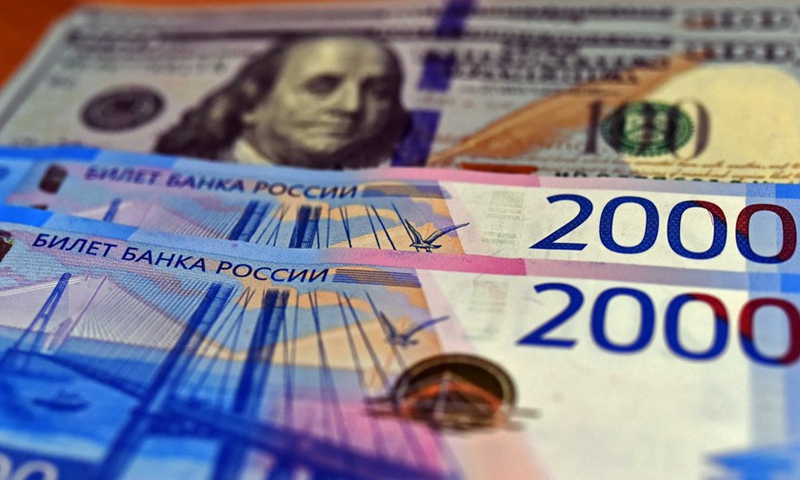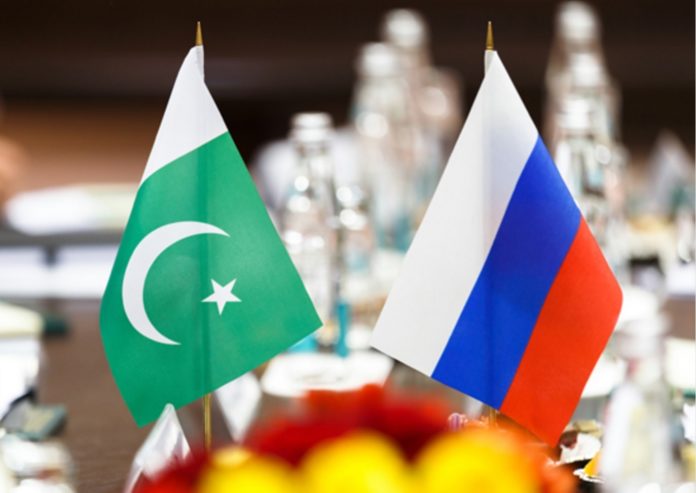The emerging cooperation between Moscow and Islamabad is gradually becoming a reality under the changing geostrategic scenario of South Asia. The recent phase of bilateral interaction started in 2016 when representatives from the two sides agreed to craft our a future of cooperation in diverse areas. a wide range of regional and international issues along with different areas of mutual interest became point of agreement between the two. State officials from both sides realized the need to adopt a closely coordinated approach for the development of a more connectivity, especially in the economic field despite having a history of estranged interaction cemented in an unforgettable phase of diplomatic complications.
The history of Pakistan-Russian relations show an unpleasant picture of two-sided diplomatic cooperation. During the confrontational designs of bipolar international system divided between United States and Soviet Union, Pakistan was unable to cultivate a closely friendly alliance with Moscow. In response to Indian selection of Soviet camp under the ambiguous non-aligned campaign, Pakistan preferred to stay in the western block of states led by the United States. Moreover, Pakistan’s growing friendship with People’s republic of China parallel to the growing Sino-Russian diplomatic rift further hindered the two sided cooperation between Moscow and Islamabad. This situation witnessed an era of deepest low in the last phase of cold War politics when the Zia regime launched an anti-communist campaign sponsored by Washington. It was post-Saur revolution Afghanistan which forced Pakistan to become an afghan resistance base against Soviet forces.
Eventually, the end of cold War and dismantlement of the Soviet Union changed the course of history. The post-cold War period heavily affected the foreign policy choices of states including Pakistan and Russia, where the leading foreign policy decision makers decided to reform the conventional patterns of their states for managing of foreign relations. no doubt, the days of decades-long hostility between Soviet union and the united States of America under the toxic rubric of cold War constrained the diplomatic collaboration between Islamabad and Moscow, their leading decision makers eventually decided to depart from an estranged format of conventional diplomatic communication and adopted an improved format of foreign relations for each other.
A series of reciprocal visits initiated between Russian Federation and Pakistan after the end of Cold War period strengthened in the post 9/11 era when the Musharraf administration attempted to normalize Pakistan’s foreign relations with various other nations. Besides a minor strategic collaboration, the economic cooperation in various fields became a significant point of bilateral relations between Moscow and Islamabad. President Pervez Musharraf in 2003 stated, during a visit to Moscow “a new era of friend ship” was coming up between two countries and both ones needed to “reinforce the good of the past and bury the bad.” Such inspiration from both sides gradually compelled the two authorities to develop various areas for mutual cooperation. Further development in reciprocal visits resulted in various bilateral engagements such as maintaining regular inter Parliamentary ties along with constructing of a consensus on joint efforts for counterterrorism. Leaders from both sides agreed for the development of an intergovernmental commission on trade and economic, scientific and technical cooperation. Economic bilateralism between Moscow and Islamabad gradually reached a significant level and witnessed substantial financial progress.
The recent phase of cooperation started in 2016 when leaders of both states agreed to conduct joint military exercises. The historical military drill witnessed an initiation of friendly period between two countries. The series of war games known as Friendship 2016 involved the Russian and Pakistani forces and let the international community realise the potential of emerging Moscow-Islamabad alliance. Prior to military exercises, Shahid Khaqan Abbasi, Federal Minister for Petroleum and Natural Resources from Pakistan and Alexander Novak, Russian Energy Minister signed an agreement of $ 2 billion for the construction of North South gas pipeline.
The desires of both states for the rebuilding of their foreign relations and improving of their bilateral engagement in various fields altered the traditional wisdom of foreign policies of Moscow and Islamabad. The leading state authorities agreed to firm up their diplomatic connections in various strategic and economic directions without considering the future threats. The future cooperation between Pakistan and Russia is mainly dependent on different joint ventures in economic affairs. The dependency on American dollar is one of the foremost problems which could not only hinder growing Pakistan-Russian friendship, but could also let international community to estimate the strength of economic cooperation between two states.

The US dollar is an international currency which is also considered a reserve currency as a larger part of foreign exchange reserve. As it is internationally considered a reserve currency, the US dollar is commonly used in international transactions, international investments while covering countless other dimensions of global economy. Besides the American dollar there is brief list of other international currencies which are considered as reserve currencies. The short list of international reserve currencies or the currencies accepted internationally in the global market for international transactions is staying away from Russian Ruble. The Ruble or Russian Ruble is the formal currency of the Russian Federation and broadly accepted as an official currency in Russia akin to US dollar. In contrast to US dollar, the Ruble is not considered as an international reserve currency.
The Russian Federation or former Soviet Union is a significant part of the international system. Its active role in world politics and long history of dynamic participation in the power politics of great powers is an unquestionable reality. Moreover, its vast geographical size, multidimensional cultural attributes, long civilizational history, massive amounts of natural resources, and strong political system have made Moscow an icon testable part of contemporary inter national system. In addition to these features, its legitimate nuclear armed status in the international nuclear non-proliferation regime and permanent seat in the United Nations Security Council, bestows upon Russia as one of the few states containing superpower potential. Despite its significant position in the world politics along with various other factors empowering Russian position in the international system, Moscow is unable to add Ruble in the international list of reserve currencies.
As compare to the US dollar, the Russian Ruble is unable to acquire a reputable position in the global financial market. Therefore, Moscow’s dependency on US dollar is an undeniable fact which will not only pose a strict check and balance on the volume of Russian trade with other nations, but it will also affect the status of other nations working with Russian in different economic projects. In order to retain its active position in the contemporary inter national system structured on inflexible contesting attributes of western and non-western divisions of world, it is essential for Moscow to emphasize the level of Ruble in the inter national financial market. On one hands the Russian government can invest their efforts for the addition of Ruble in the list of international reserve currencies. On the other hand, the leading Russian economists can develop a sufficient trust level with economic partners of Moscow which will eventually lead Russian Federation to trade on bilateral basis instead of always relaying on US dollar.
No doubt, the developing bilateral relations between Moscow and Islamabad will be beneficial for both countries but there are some obstacles which can heavily undermine the economic engagement of both states, as discussed above. The government of both states have successfully started a phase of bilateral interaction which will enable their leaders to overcome the historical trust-deficit level. A close diplomatic cooperation will further enable the two sides to pre vent the elements hindering their bilateral collaboration in various fields. In view of abovementioned currency issues, Pakistani and Russian authorities need to take timely action in settling currency matters before designing further economic initiative’s.




